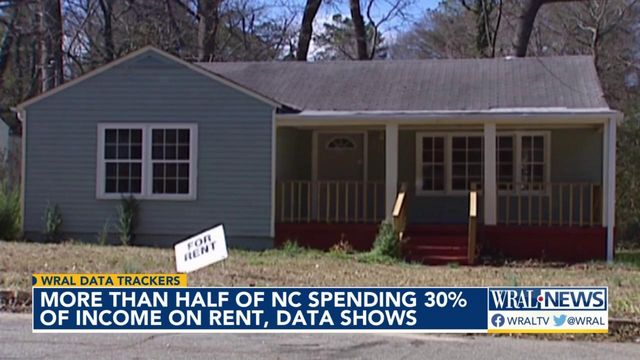About half of North Carolina and Wake County renters burdened by increasing prices, data shows
Keenan Schlecht has called North Hills home for four years.
In that time, the 27-year-old has seen his rent increase significantly. What started out as paying $950 per month has jumped to $1,560, he said.
"In the last year or two, I’ve started losing money," Schlecht said. "It's a few dollars a month, but it is a good thing I saved up before that. It hasn’t been easy."
While Schlect pays less than the average Raleigh renters, the 64% jump over a four-year time is significant. He said he is spending more than half of what he earns monthly to afford his apartment.
The increasing prices are squeezing out some people. Also, like Schlecht, it is putting pressure on their finances.
The North Hills resident who spoke with WRAL News isn't alone in paying a hefty portion of his monthly income on rent. In fact, Census data shows, he isn't even in the minority.
About half of North Carolinians and Wake County are spending 30% or more of their monthly income on rent alone. This is defined by the U.S. Dept. of Housing and Urban Development as being cost burdened -- those who pay more than 30% of their income for housing and may have difficulty affording necessities such as food, clothing, transportation, and medical care.
Schlecht said he relates to that and takes similar measures because he doesn't have the means to afford those sort of necessities.
"I have to cut costs in a lot of other ways," he said. "I try to minimize my grocery budget to like $20 a week. I don’t buy new things."
That's what concerns some state lawmakers, like state Sen. Lisa Grafstein, D-Wake.
"It’s not just the lack of availability of housing," Grafstein said. "It is housing costs that are wildly out of control relative to people’s budgets."
This legislative session she proposed a bill which would completely change the state’s current law on rent control. Unlike some states, local governments are prohibited from setting rent control and Grafstein said, some people in North Carolina don't even know that such laws exist in other regions of the country.
"You get an apartment and the rent is limited in how much it can change over time," she said when describing the practice. "The purpose is that renting stays affordable for people as they age and so we don't have an inflation of rental costs."
Grafstein said, as written, North Carolina's laws are landlord friendly and do not offer many protections for tenants. The bill Grafstein sponsored eliminated all language which, if it had passed, would enable local governments to set rent control.
"The issue from my point of view is that a local governments – whether it’s a town, county city – really need to manage growth in their own areas and manage the availability of housing and particularly affordable housing," Grafstein said.
The bill didn't go anywhere this legislative session, which Grafstein didn't find surprising but she said it did get people talking about housing laws in the state.
Given that the current law prohibiting rent control remains, concerns grow for renters like Schlecht, who worry what will happen to them as rent goes up around Raleigh.
"I feel like I could be outplaced if things keep going the way they are and I don’t make some financial changes and career moves," he says.
Schlect is originally from Maryland. He also expressed concerns about being able to save up to buy a house since most of his money is now going to paying rent.











